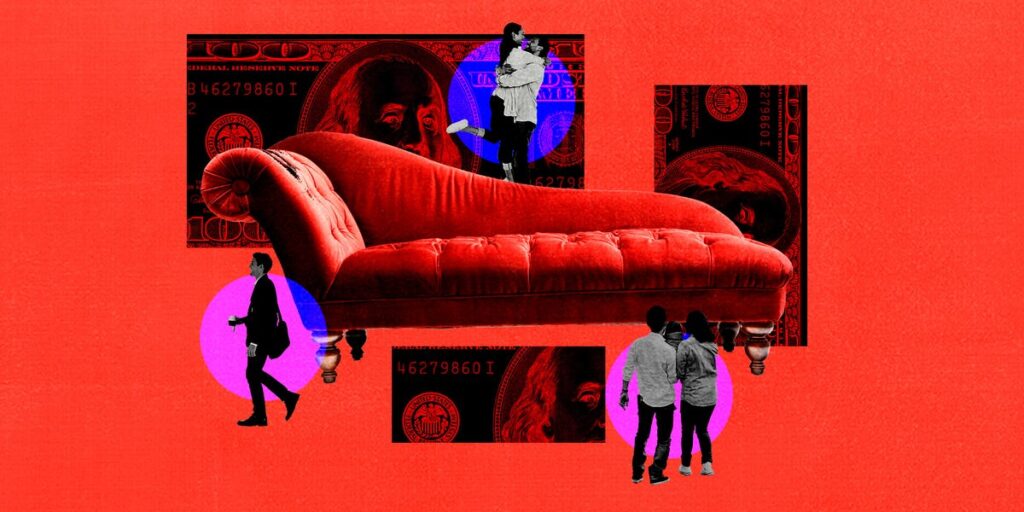- Four therapists shared what their clients on different incomes discuss in sessions.
- Money can be a source of stress for both those on lower incomes as well as the ultra-rich.
- “Emotions are emotions, pain is pain” one therapist said.
We may think getting that big promotion with a hefty pay rise would solve all our problems, but would it?
As Business Insider learned from interviewing therapists with clients across the socioeconomic spectrum —from ALICEs to HENRYs and beyond — while it’s easy to see why having a low income can cause stress — particularly with growing wealth inequality — rich people have their own worries.
So what are people on different incomes discussing with their therapists?
People on low incomes
Anna Nathanson, a licensed clinical social worker and therapist based in New York, runs a website called Low-Cost Therapy NYC. She said that “financial instability really eats at people’s souls.”
It affects not only people’s physical well-being but also their interpersonal relationships and self-worth, which is linked to money for many.
Clients might talk about arguing about money with their partner, job hunting, having to rely on friends for childcare, or how their income affects their self-esteem, Nathanson said.
She has also helped patients work through chronic trauma responses, such as depression or nightmares, that they have developed from repeatedly not having their basic needs met.
Dr. Ashley Castro, a New York-based clinical psychologist who started Healwise, an affordable and accessible therapy nonprofit, said: “Poverty brings with it so many different kinds of stress.”
She added: “There is a lot that’s out of their control that can be difficult emotionally. It’s just a reality that life can be tough if you don’t have a lot of money.”
ALICEs
ALICEs (Asset Limited, Income Constrained, Employed) are people who earn enough to sit above the federal poverty line but struggle with the cost of living.
Dr. Tracy Williams, a psychologist and certified financial therapist in Atlanta, said that people with little money can end up overspending and getting into debt because they might be “trying to live a life that they desire for themselves that they cannot yet afford.”
On the other hand, people who have become ALICEs — for instance those who have lost wealth or grew up in financially stable homes but don’t make as much as their parents — may develop scarcity mindsets, Williams said.
As such, while some ALICEs will discuss in therapy their need to hoard money others talk about wanting to “live it up” and spend recklessly when they are able, she said.
HIFIs
HIFIs (High Income, Financially Insecure) earn a high salary, but spend so much they end up living paycheck to paycheck.
Just over half of people who make $100,000 or more live paycheck to paycheck, according to a 2023 report by the data analytics and financial services companies PYMNTS and LendingCompany.
“That is not because they don’t have enough, but it’s often because they are overspending or not financially aware,” Williams said.
This may be due to the increased cost of living, which has contributed to many people’s financial insecurity, she said.
Many of Williams’ clients say they also feel pressured to spend above their means in order to keep up with the lifestyles of their peers that they see on social media.
HENRYs
Some HENRYs (High Earners, Not Rich Yet) might seem wealthy to others, but still worry about having enough money, Williams said, because “it’s all relative.”
She gave the example of higher-earning clients who invest in stocks and worry markets could crash at any time, despite that being unlikely.
HENRYs who didn’t grow up with much money might tell Nathanson that they feel guilty being wealthy, she said. They might also talk about feeling uncomfortable receiving gifts because they don’t feel deserving, she said.
Or they may feel the reverse and have an unnecessary scarcity mindset. Such people often talk to Nathanson in therapy about feeling “really nervous about spending anything and feeling like they can’t indulge in any way.”
Two HENRYs in a couple, meanwhile, might want to discuss tension in their relationship if they have different ways of thinking about shared wealth, she said.
Ultra-high net worth individuals
“The stereotype is that rich people problems aren’t real problems, that they’re just in therapy talking about really inconsequential trivial things,” Castro said. “But my patients have real issues and they genuinely struggle.”
Dr. Paul L. Hokemeyer, a licensed marriage and family therapist and clinical consultant to ultra-high net-worth people, based in Colorado, agreed with Castro.
“At the core, people of wealth suffer from the same mental health and relational issues as the rest of humanity,” he said.
For example, Hokemeyer helps people who feel “objectified” and “vilified” because of their wealth; who feel pressure to use it in productive ways; and who deal with the “highly stressful and chaotic” process of starting a business.
Well-off children and teens, meanwhile, must often deal with the expectation that they will get into elite educational institutions with intense workloads, Castro said. The pressure to achieve can cause problems with perfectionism and anxiety disorders, as well as depression from a lack of downtime and fun.
Williams said that she sees a lot of guilt and hopelessness in her wealthier clients, because they realize they can’t make as big a difference in the world as they would like to. And, as people live longer, she said that some worry about not having enough money to sustain their lifestyles as they get older.
Wealth can also cause issues within families, she said, with disagreements over wills, estates, and spending on vacations.
According to Hokemeyer, “wealth can be both a blessing and a curse,” but, at the end of the day, “emotions are emotions, pain is pain.”
Read the full article here


